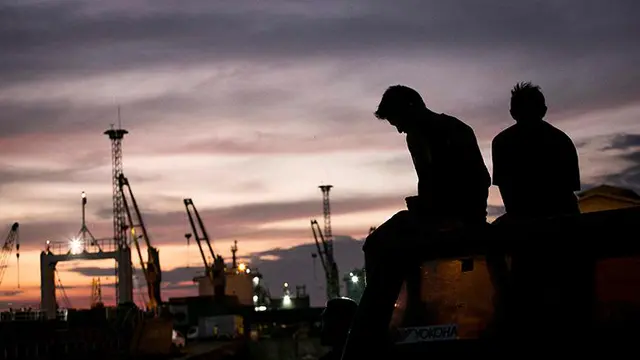By APD writer Melo M. Acuna
MANILA, Dec.7 (APD) – Bangko Sentral ng Pilipinas Deputy Governor Diwa C. Guinigundo said the Global Financial Crisis (GFC) “painfully taught policy makers around the world that economic policies do not operate in a vacuum.”
Deputy Gov. Diwa C. Guinigundo says good policymaking is founded on good economics, good politics and interaction. He was keynote speaker at this year's Pilipinas Conference 2018 organized by Stratbase and Albert Del Rosario Institute. (Melo M. Acuna)
Speaking before the Albert Del Rosario Institute’s Pilipinas Conference 2018, he said political issues can potentially cause a systematic grit on the wheels of policymaking and alter their intended outcomes.
“Similarly, sub-optimal economic policies can potentially fuel discontent among the public which could lead to adverse political events that can at times have widespread and enduring effects on the broader economy,” he explained.
Mr. Guinigundo said bad politics begets bad economics because uncertainty has remained elevated and the uncertainty “has been driven more by political developments instead of the usual economic interplay of demand and supply factors in the markets.”
He described the rising trend of populist sentiments fueled greater incidence of zero-sum outcomes. He cited countries leaving economic unions “as with Brexit” and concerns over rising trade barriers have occurred with the United States and China embroiled in a tit-for-tat trade strategy in recent months.
“In September 2018, the Trump Administration finalized tariffs on more than US$ 200 billion of Chinese imports,” he said as these political events may significantly affect economic growth.
He said at first, shocks would lead to transitory capital flow volatility and bouts of financial market turbulence. He added higher volatility could also dampen animal spirits and “lead to what psychologists call an ‘effect heuristic’ among economic agents as risk perceptions endure and make people more cautious about the future.”
“This translates to less investments and ultimately lower growth,” the BSP deputy governor explained.
He also quoted a report from the International Monetary Fund (IMF) which estimates an escalation of the trade war “could shave-off 0.8 percentage point of the global growth by 2020.”
He underscored that political events are generally unquantifiable and difficult to predict as the “uncertainty in the operating environment that they generate can confound causal relations between economic variables which, in turn, can render the formulation of appropriate policies even more difficult.”
Deputy Governor Guinigundo said the Philippines for the past 25 years embarked on what he described as “often difficult and painful reforms”, which are necessary to build and strengthen the country’s institutions.
He described these as the expansion of the role of market forces in key sectors of the economy, with the liberalization of the banking, telecommunications, transport and power sectors.
“The creation of the Bangko Sentral ng Pilipinas (BSP), as the country’s independent monetary authority along with efforts to strengthen the banking system which were put forward and are equally vital,” he added.
The reforms propelled the economy to 79 consecutive quarters of uninterrupted growth which means 19 years and three quarters since the first quarter of 1999.
“The structural reforms have been translated into higher potential output for the economy,” he explained as estimates show that potential output growth has risen, averaging at 6.0 percent from 2010 to 2017.
He downplayed claims by some sectors of large output gap which he described as without basis.
“Our output gap is either a small positive or a small negative so the issues about overheating is quite misplaced,” the senior bank official explained.
Mr. Guinigundo said with the reforms made in the past placed the current administration in a much favorable position to push for further reforms and leverage on the strong political capital it possesses.
The Duterte Administration, the senior bank official said has addressed bottlenecks in government services by automating processes, establishing on-line services, and improving public’s transactional interface with government.
All these will reduce costs of doing business and translate a more competitive and productive business and workforce.
The Philippines, according to the senior bank official has improved its creditworthiness as it reached investment-grade as it earned a niche of one with the brightest prospects worldwide.
He assured his audience the Bangko Sentral ng Pilipinas will make its policies more responsive to emerging challenges through further improvement of their framework considering emerging trends and tipping points, dialogues to address issue of inequality to forestall major disruption because it feeds into political unrest and dissatisfaction, and leverage technological innovations and digitization for inclusive growth.
“Our focus on income inequality has also reaffirmed out commitment to price stability as in an emerging and developing economy like the Philippines, keeping process within target benefits the poor most, specially the lowest income classes of the population,” he added.
He said they track inflation rates for the poorest segment of society, specially the difference in their basket of goods and economic behavior to control inflation because they take the heavier brunt if government economic managers miss the target.
“We need to look at the bigger picture because good policymaking is about good economics, good politics and their interaction,” Mr. Guinigundo concluded.
(ASIA PACIFIC DAILY)
 简体中文
简体中文










